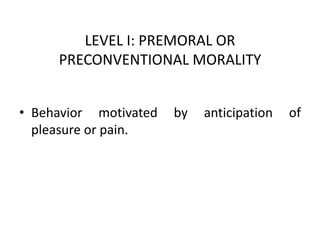Kohlberg's stages of moral development
- 1. KOHLBERG’S STAGES OF MORAL DEVELOPMENT Amielyn Cassandra U. Estolano
- 4. LEVEL I: PREMORAL OR PRECONVENTIONAL MORALITY • Behavior motivated pleasure or pain. by anticipation of
- 5. • STAGE 1: PUNISMENT AND OBIENDIENCE The earliest stage of moral development is especially common in young children, but adults are also capable of expressing this type of reasoning. At this stage, children see rules as fixed and absolute. Obeying the rules is important because it is a means to avoid punishment.
- 6. • STAGE 2: INDIVIDUALISM AND EXCHANGE At this stage of moral development, children account for individual points of view and judge actions based on how they serve individual needs. In the Heinz dilemma, children argued that the best course of action was the choice that best-served Heinz’s needs. Reciprocity is possible at this point in moral development, but only if it serves one's own interests.
- 7. LEVEL II: CONVENTIONAL MORTALITY • Acceptance of the rules and standards of one’s group.
- 8. • STAGE 3: INTERPERSONAL RELATIONSHIP Often referred to as the "good boy-good girl" orientation, this stage of moral development is focused on living up to social expectations and roles. There is an emphasis on conformity, being "nice," and consideration of how choices influence relationships.
- 9. • STAGE 4: MAINTANING SOCIAL ORDER At this stage of moral development, people begin to consider society as a whole when making judgments. The focus is on maintaining law and order by following the rules, doing one’s duty and respecting authority.
- 10. LEVEL III: POSTCONVENTIONAL OR PRINCIPLED MORTALITY • Morality is defined in terms of conformity to shared standards, rights, or duties apart from supporting authority. The standards conformed to are internal, and action-decisions are based on an inner process of thought and judgement concerning right and wrong.
- 11. • STAGE 5: SOCIAL CONTRACT AND INDIVIDUAL RIGHTS At this stage, people begin to account for the differing values, opinions and beliefs of other people. Rules of law are important for maintaining a society, but members of the society should agree upon these standards.
- 12. • STAGE 6: UNIVERSAL PRINCIPLES Kohlberg’s final level of moral reasoning is based upon universal ethical principles and abstract reasoning. At this stage, people follow these internalized principles of justice, even if they conflict with laws and rules.













